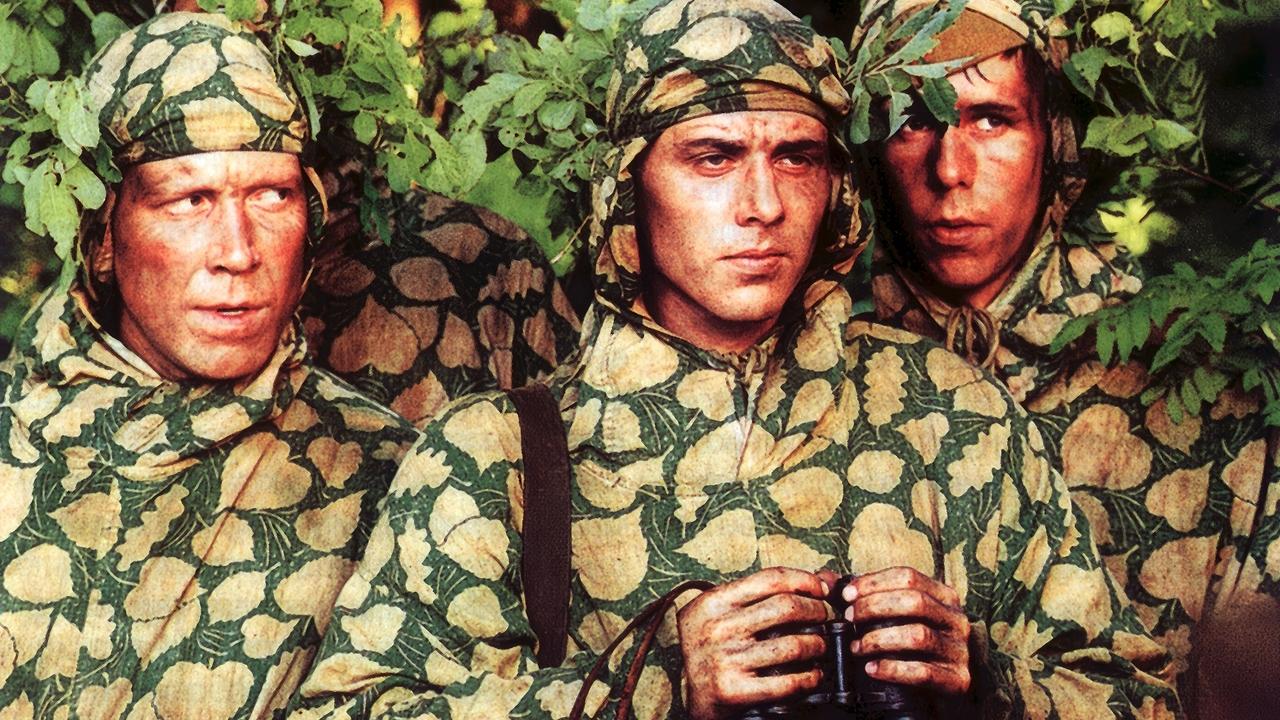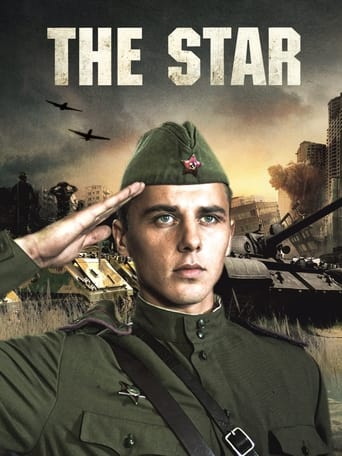

After seeing the Russian film 9 ROTA set during the Soviet -Afghan conflict I was struck how similar it was to American war films which disappointed me since I was expecting something with a much more idiosyncratic style . I had better hopes for ZVEZDA since it is set during the second world war . The Soviet Union lost a grand total of 30 million citizens during the conflict . Putting it in to perspective both Britain and the USA lost around 350,000 war dead each . No Soiet family was left untouched and many Soviets died in the most cruel way possible . There's a famous Soviet film COME AND SEE which gives a small taste of the brutality of the Eastern front so I looked forward to this film with anticipation . Sadly like 9 ROTA I was disappointed with it for exactly the same reason - it seems more like a Hollywood movie than a Russian one The plot is simple . A team of reconnaissance scouts is sent behind Nazi lines to pick up information . It's obvious what director Nicolai Lebedev and the screenwriters are going to do with the story - they're going to make a suspenseful war drama where every five minutes the unit are in mortal danger of being caught . Two previous units on the same mission have disappeared and the unit come across the tortured bodies of one of their predecessors . This lets even the most uneducated audience members know that 1 ) The mission is dangerous 2 ) If they're caught they won't face a simple death of a bullet - they'll be skinned alive Unfortunately the more danger the unit face the more unlikely things become . For example two of the scouts climb aboard a German truck . All of a sudden Germans appear and drive the trucks off towards the German base . Two Germans sit in the back of the truck and suddenly become suspicious so pull out their pistols as they prepare to search he back . Then out of nowhere a Soviet air raid takes place allowing our scout heroes to make good their escape . Every time it looks like the unit are going to be caught something always happens that allows the unit to escape regardless of how unlikely it is . This scene also interferes with the time frame since the truck must have traveled several miles but the surviving scout manages to walk back to his unit in what seems a few minutes As far as I can remember the year isn't mentioned on screen but since the Red Army are on the frontier of the Western Soviet Union then it can only be happening in 1944 . This leads to a serious inaccuracy in the dialogue where the unit find out the Nazis are going to launch a counter-offensive with " 40,000 men and 2,000 tanks " What the Nazis had 2,000 tanks to spare in the Summer of 1944 ? I knew the biggest tank battle in history took place between the Wermacht and Red Army the previous year at Kursk where the Nazis had a grand total of 2,700 tanks . Certainly there's no way they could muster that amount of tanks in the Summer of 1944 so I take it the subtitles are wrong and should have read 200 . Even so this wouldn't have been enough to launch a counter-offensive against the Soviets who had an army of 1,500,000 ready to launch Operation Bagaration Things like this spoil the movie but it's not really a film that concerns itself with portraying history accurately otherwise we wouldn't be seeing scenes with a Soviet scout feeling sorry for the unit executing Nazi prisoners or references to " The liberation of Poland " . Its sole function is to keep the audience on tenterhooks as to the individual fate of the unit members . In this it succeeds to a large degree but one had hoped to have seen a much more " Soviet " type of film rather than a Russian film trying to emulate Hollywood
... View MoreFor domestic audiences I can see how they would applaud this movie. For outsiders, with no vested interests, it did not make much sense. The Germans were portrayed as incompetents and the Russians as heroes. The supposedly romantic angle was superfluous and a distraction. How a young woman could 'love' the lieutenant from just glimpsing him was nonsense. How she could, as mentioned at the end of the movie, never marry just because of this infatuation was beyond me. I mentioned the Germans were portrayed as idiots and that was exemplified in the chase into the marsh. Several hundred German troops advanced, pushing the Russians into the marsh. So the Russians hid and the Germans stopped at the edge of the marsh and just stood there listening. I suppose they did not want to get their boots wet, but I am sure an officer would have ordered 20 or 30 men into the water to search the marsh. But that would have ended the story. Also, the Germans entered the barn where the Russians were hiding in the loft and did not bother to fire into the roof. At the worst some soldier would have tossed a grenade into the loft and not climbed a ladder to peer in.I did see some reviewers who said they cried at the end. I wonder why? You knew this small band would perish and they was nothing heart-tugging in that.
... View MoreI would say Zvezda is well worth seeing for its sociological value. In short, i see it as the kind of incredibly primitive patriotic propaganda deemed necessary to restore the faith of the population in Putin's tattered Russia by flattering the century-old Russian soft spot for militarism.Besides, Lebedev openly and shamelessly copies Spielberg's "saving private Ryan". The rip-off become obvious when you compare the characters with the original short story (which was awarded the Stalin prize in 1947 !). You will see the German-speaking-greenhorn spring right from Spielberg's script. Same goes for the gross simplifications of the military context. As Spielberg replaces German garrison troops armed with 1940 obsolete French light tanks with first-line veterans supported by Tiger tanks, Lebedev makes up grotesque figures - 10 000 men to chase a handful of Russian scouts ! - and turns what the short story describes as a limited counter-offensive into the threat of an Eastern front version of the battle of the Bulge. This rewriting of history simply stinks.On the same line, one can recognize a scene that borrows heavily from various elements of Sam Peckinpah's "cross of iron" in the middle of the movie. One can also notice the addition of the utterly idiotic final scene (a nearly perfect copy of the equally unrealistic private Ryan finale), where Russian cowboys slaughter stormtroopers (more star wars than Waffen SS style) by the dozen, where the aforementioned greenhorn uses his last breath to lecture the hero about switching a radio transmitter, where the good savage from the steppes, unhindered by a couple of rifle caliber bullets in the arm, continues picking off enemies 100 m away with his PPS 42 submachine-gun, the idiot Germans camp 50m from a barn they could have reduced to matchsticks from a safe distance with mortar, canon or machine-gun fire, etc.The short story was also mainly a bunch of patriotic ranting, but at least the author had seen actual fighting and did not depict such stupid scenes (in the short story the scouts simply throw a couple of grenades at the handful of soldiers probing the barn and escape before the Germans can bring in reinforcement). It also contained some indications about the terrible pressure inside the Red Army during the Stalin era, the very limited support of the "liberated" populations of Bielorussia, and the savage behavior of soldiers of both camps. All this has been utterly wiped out from the movie, leaving only cardboard heroes fighting a kind of generic enemy.By the way, I can't see how anyone could have appreciated the infamous performances of lieutenant Travkin and private Simakova. A fine example of over-the-top and contrived acting from these two main protagonists. Admitedly some secondary characters were not bad, within the limited bounds of their simplistic lines.These kind of fictions that revel in both cheap and fake poetry of war (the reason why the only female character casts languid looks at the starry sky is unfortunately kind of lost in translation : speaking on the radio she can hear the hero say "ia zvezda" which can mean both "star speaking" and "I am a star") are just a step toward the building of another generation of canon fodder. Considering what is currently happening in Chechnya, that movie really gives me the creeps.Have a look at "vremia sobirat' kamni" (the time to pick up stones (instead of throwing them)) instead. A much more interesting point of view on the sequels of WWII in Russia, that shows there is still room in Russia for directors wanting to go a bit farther than primary xenophobia and stupid, blind nationalism.
... View MoreHi!Zvezda got two golden eagle (zolotoi oryol) prize for best cinematography and best music for Russian movies of 2002.Theme music by guitar solo or strings orchestra portrays romantic love feeling of Katya, a young female soldier in front head quarter communication unit who loves "Zvezda" scout team leader lieutenant Trabkin.Beside this is a serious and precise war combat story, this is romantic love story with lovely music.
... View More